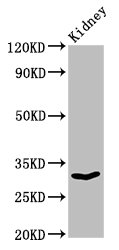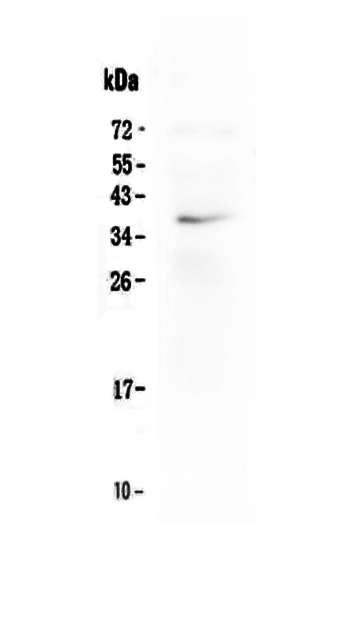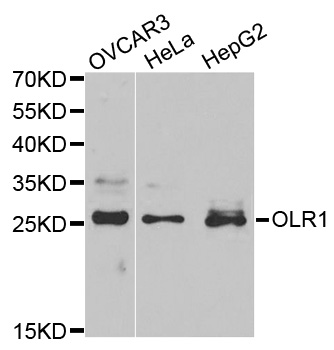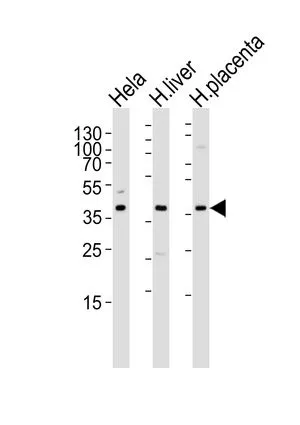![FACS analysis of PBMC cells using GTX54456 OLR1 / LOX-1 antibody [23C11]. Red : Isotype control Blue : Primary antibody Dilution : 3 μg/ml FACS analysis of PBMC cells using GTX54456 OLR1 / LOX-1 antibody [23C11]. Red : Isotype control Blue : Primary antibody Dilution : 3 μg/ml](https://www.genetex.com/upload/website/prouct_img/normal/GTX54456/GTX54456_20201207_FACS_8_w_23060900_391.webp)
FACS analysis of PBMC cells using GTX54456 OLR1 / LOX-1 antibody [23C11]. Red : Isotype control Blue : Primary antibody Dilution : 3 μg/ml
OLR1 / LOX-1 antibody [23C11]
GTX54456
ApplicationsFlow Cytometry, ImmunoFluorescence, ImmunoCytoChemistry, ImmunoHistoChemistry, ImmunoHistoChemistry Paraffin, Neutralisation/Blocking
Product group Antibodies
ReactivityHuman, Mouse
TargetOLR1
Overview
- SupplierGeneTex
- Product NameOLR1 / LOX-1 antibody [23C11]
- Delivery Days Customer9
- Application Supplier NoteFCM: 10 microg/ml. *Optimal dilutions/concentrations should be determined by the researcher.Not tested in other applications.
- ApplicationsFlow Cytometry, ImmunoFluorescence, ImmunoCytoChemistry, ImmunoHistoChemistry, ImmunoHistoChemistry Paraffin, Neutralisation/Blocking
- CertificationResearch Use Only
- ClonalityMonoclonal
- Clone ID23C11
- Concentration100 ug/ml
- ConjugateUnconjugated
- Gene ID4973
- Target nameOLR1
- Target descriptionoxidized low density lipoprotein receptor 1
- Target synonymsCLEC8A, LOX1, LOXIN, SCARE1, SLOX1, oxidized low-density lipoprotein receptor 1, C-type lectin domain family 8 member A, hLOX-1, lectin-type oxidized LDL receptor 1, ox LDL receptor 1, oxidized low density lipoprotein (lectin-like) receptor 1, oxidized low-density lipoprotein receptor 1, soluble form, scavenger receptor class E, member 1
- HostMouse
- IsotypeIgG1
- Protein IDP78380
- Protein NameOxidized low-density lipoprotein receptor 1
- Scientific DescriptionThis gene encodes a low density lipoprotein receptor that belongs to the C-type lectin superfamily. This gene is regulated through the cyclic AMP signaling pathway. The encoded protein binds, internalizes and degrades oxidized low-density lipoprotein. This protein may be involved in the regulation of Fas-induced apoptosis. This protein may play a role as a scavenger receptor. Mutations of this gene have been associated with atherosclerosis, risk of myocardial infarction, and may modify the risk of Alzheimers disease. Alternate splicing results in multiple transcript variants.[provided by RefSeq, Feb 2010]
- ReactivityHuman, Mouse
- Storage Instruction2°C to 8°C
- UNSPSC41116161

![IHC-P analysis of human spleen tissue using GTX54456 OLR1 / LOX-1 antibody [23C11]. Dilution : 1:100 IHC-P analysis of human spleen tissue using GTX54456 OLR1 / LOX-1 antibody [23C11]. Dilution : 1:100](https://www.genetex.com/upload/website/prouct_img/normal/GTX54456/GTX54456_20201207_IHC-P_16_w_23060900_208.webp)






